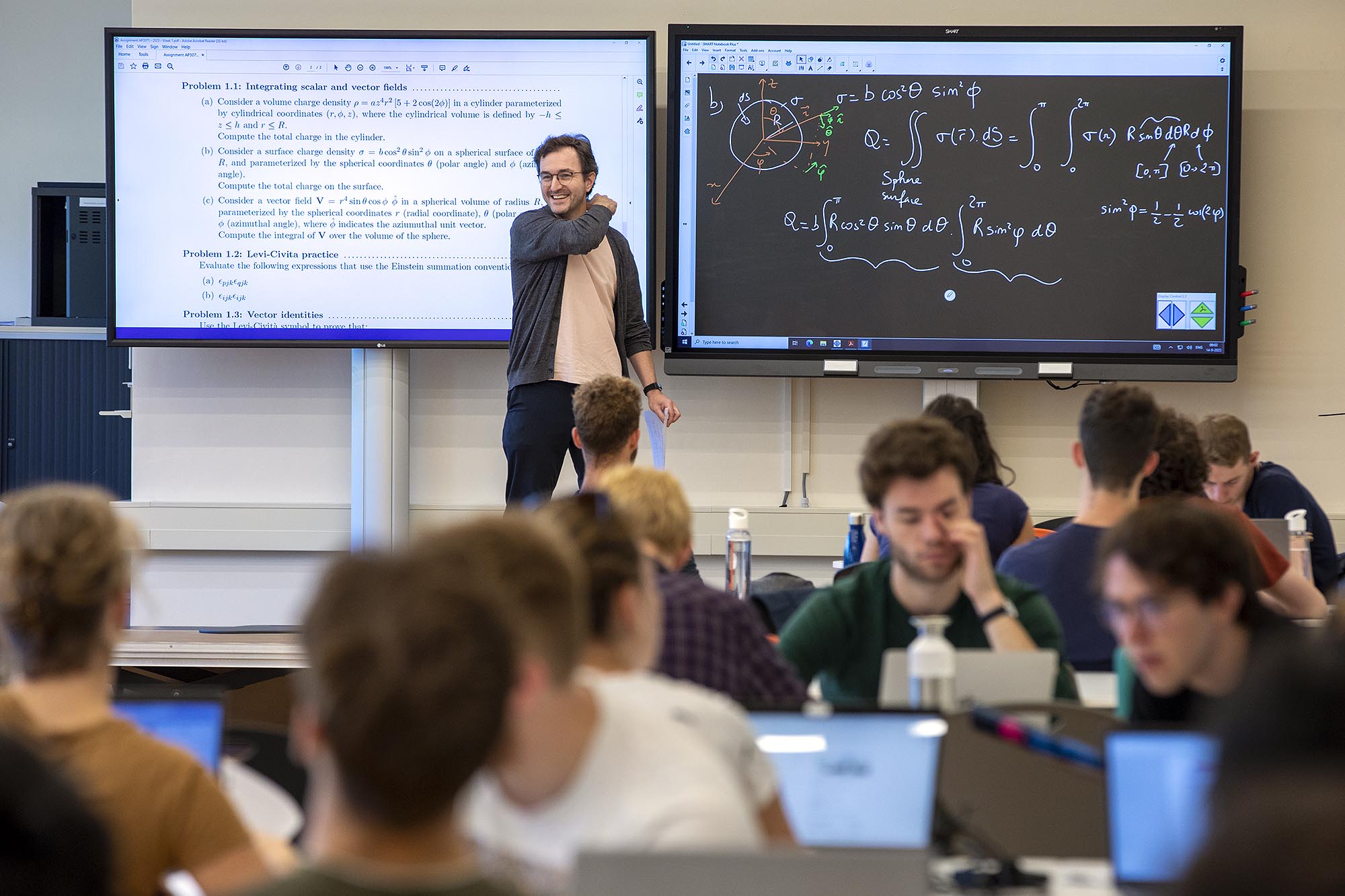The government is planning a language assessment for all English-taught Bachelor’s programmes: could they be given in Dutch? An advance survey of five such programmes reveals they have solid arguments for their choice of language of instruction.
Dr. Aurele Adam, Programme Director Applied Physics, loves lecturing. (Photo: TU Delft)
A significant majority of MPs believe that the influx of international students is too high and, therefore, Bachelor’s programmes should alter their language of instruction: English will only be permissible if there are compelling justifications for its use. A special language assessment for the Bachelor’s programmes currently taught in another language should distinguish between those with valid reasons for their language choice and those without.
Programmes must meet certain criteria, such as labour market relevance or the inherently ‘international nature’ of the programme, to teach their curriculum in another language, or else switch to Dutch. The presence of the programme in a region facing population decline will also be considered a relevant factor.
The education minister asked the Inspectorate of Education to look into the reasons why programmes offer English-language education and to find out what students and teachers think about switching to Dutch.
Reasons
The inspectors carried out a comprehensive study including in-depth interviews across five separate university Bachelor’s programmes in Groningen, Leiden, Tilburg, Wageningen and the University of Amsterdam (UvA). Though the Inspectorate remains discreet regarding the Internationalisation in Equilibrium Bill (and the accompanying language assessment), the report’s significance is already evident.
Teaching is largely provided by international researchers
All five programmes cite roughly the same reasons, with the Inspectorate observing that the justifications given come across as well-considered and careful. The programmes highlight the international orientation of the labour market, for example, or say that international students are needed due to labour market shortages. “Furthermore, education and research are closely integrated”, the Inspectorate concludes. “Teaching is largely provided by international researchers.”
Cascading impact
The five programmes are clear that they do not support switching to Dutch. They fear a cascading impact where they lose staff and students, resulting in heavier workloads for the remaining teaching staff and a deterioration in education quality.
Students also are not in favour of switching to Dutch-language education. Dutch students are assured that their job prospects will remain unaffected by pursuing English-language programmes, as they believe their native Dutch language skills are adequate.
There are more reasons for maintaining English-language teaching. In science and academic circles in general, English is often the working language, used in everything from specialist literature to jargon. English is also commonly used on the floor of many internationally oriented companies. Added to that, it is believed that an English-taught Bachelor’s programme makes the transition to an English-taught Master’s programme easier.
English is often the working language, used in everything from specialist literature to jargon
Moreover, international and Dutch students could gain valuable insights from each other, particularly in developing intercultural skills, for example. The idea is that an international classroom is an excellent environment for learning about different perspectives and cultures. An international team of educators is essential for programmes of this type.
Dutch as an academic language
At the same time, universities say they are keen to promote Dutch as an academic language. They offer Dutch classes to international students, with both free and paid options. International educators are also encouraged to learn Dutch, although they may continue to teach in English.
The big question now is: would these programmes get through the assessment? The Inspectorate remains silent on the matter.
Necessarily so, given that a different supervisory authority (the Committee for Higher Education Effectiveness, CDHO) will be conducting the assessment.This did not sit well with the chairman of the Committee, Paul Rullmann, due to its concurrence with university funding cuts. Earlier this year, he told HOP that he was considering resigning his position.
Following a deal with opposition parties – a cut in the international student budget has been softened – Education Minister Eppo Bruins has promised to amend the Internationalisation in Equilibrium Bill. Programmes in regions facing population decline and the surrounding areas will receive special treatment. How this plays out in practice remains to be seen.
The five programmes studied are Biomedical Engineering (Groningen), Data Science & Artificial Intelligence (Leiden), Econometrics and Operations Research (partly bilingual, Tilburg), Marine Sciences (Wageningen) and Human Geography and Planning (English and bilingual variants, UvA).
HOP, Bas Belleman | Translation: Taalcentrum-VU
Do you have a question or comment about this article?
redactie@hogeronderwijspersbureau.nl


Comments are closed.